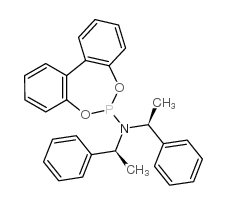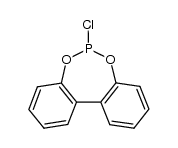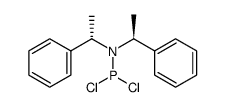376355-58-7
| Name | N,N-bis[(1S)-1-phenylethyl]benzo[d][1,3,2]benzodioxaphosphepin-6-amine |
|---|---|
| Synonyms | MFCD08277033 |
| Boiling Point | 578.426ºC at 760 mmHg |
|---|---|
| Melting Point | 99-102ºC |
| Molecular Formula | C28H26NO2P |
| Molecular Weight | 439.48500 |
| Flash Point | 303.621ºC |
| Exact Mass | 439.17000 |
| PSA | 29.52000 |
| LogP | 8.75040 |
|
Section 1: Product Identification Chemical Name:N,N-Bis[(1S)-(-)-phenylethyl]dibenzo[d,f][1,3,2]dioxaphosphepin-6-amine CAS Registry Number:376355-58-7 Formula:C28H26NO2P EINECS Number:none Chemical Family:phosphine-amine ligand Synonym:(5,7-Dioxa-6-phospha-dibenzo[a,c]cyclohepten-6-yl)-bis-(1(S)-(-)--phenyl-ethyl)-amine
Section 2: Composition and Information on Ingredients IngredientCAS NumberPercentACGIH (TWA)OSHA (PEL) Title compound376355-58-7100%no datano data Section 3: Hazards Identification Emergency Overview:Irritating to skin, eyes and respiratory tract. Primary Routes of Exposure:Ingestion, inhalation Eye Contact:Causes slight to mild irritation of the eyes. Skin Contact:Causes slight to mild irritation of the skin. Inhalation:Irritating to the nose, mucous membranes and respiratory tract. Ingestion:No information available on the physiological effects of ingestion. May be harmful if swallowed. Acute Health Affects:Irritating to skin. Dust may be irritating to eyes and respiratory tract. Chronic Health Affects:No information on long-term chronic effects. NTP:No IARC:No OSHA:No SECTION 4: First Aid Measures Immediately flush the eyes with copious amounts of water for at least 10-15 minutes. A victim may need Eye Exposure: assistance in keeping their eye lids open. Get immediate medical attention. Wash the affected area with water. Remove contaminated clothes if necessary. Seek medical assistance if Skin Exposure: irritation persists. Remove the victim to fresh air. Closely monitor the victim for signs of respiratory problems, such as difficulty Inhalation: in breathing, coughing, wheezing, or pain. In such cases seek immediate medical assistance. Seek medical attention immediately. Keep the victim calm. Give the victim water (only if conscious). Induce Ingestion: vomiting only if directed by medical personnel. SECTION 5: Fire Fighting Measures Flash Point:none Autoignition Temperature:none Explosion Limits:none Extinguishing Medium:carbon dioxide, dry powder or foam If this product is involved in a fire, fire fighters should be equipped with a NIOSH approved positive pressure Special Fire Fighting Procedures: self-contained breathing apparatus and full protective clothing. Hazardous Combustion andIf involved in a fire this material may emit irritating fumes. Decomposion Products: Unusual Fire or Explosion Hazards: No unusual fire or explosion hazards. SECTION 6: Accidental Release Measures Spill and Leak Procedures:Small spills can be mixed with vermiculite or sodium carbonate and swept up. SECTION 7: Handling and Storage The material will degrade on prolonged exposure to moisture. Store under an inert atmosphere of nitrogen or Handling and Storage: argon. SECTION 8: Exposure Controls and Personal Protection Eye Protection:Always wear approved safety glasses when handling a chemical substance in the laboratory. Skin Protection:Wear protective clothing and gloves. Ventilation:Handle the material in an efficient fume hood. If ventilation is not available a respirator should be worn. The use of respirators requires a Respirator Respirator: Protection Program to be in compliance with 29 CFR 1910.134. Ventilation:Handle the material in an efficient fume hood. Additional Protection:No additional protection required. SECTION 9: Physical and Chemical Properties Color and Form:white powder Molecular Weight:439.49 Melting Point:no data Boiling Point:no data Vapor Pressure:no data Specific Gravity:no data Odor:none Solubility in Water:insoluble SECTION 10: Stability and Reactivity Stability:moisture sensitive Hazardous Polymerization:no hazardous polymerization Conditions to Avoid:prolonged exposure to moisture Incompatibility:oxidizing agents and halogens Decomposition Products:carbon dioxide, carbon monoxide, organic fumes, phosphorus oxides. SECTION 11: Toxicological Information RTECS Data:No information available in the RTECS files. Carcinogenic Effects:no data Mutagenic Effects:no data Tetratogenic Effects:no data SECTION 12: Ecological Information Ecological Information:No information available SECTION 13: Disposal Considerations Disposal:Dispose of according to local, state and federal regulations. SECTION 14: Transportation Shipping Name (CFR):Non-hazardous Hazard Class (CFR):NA Additional Hazard Class (CFR):NA Packaging Group (CFR):NA UN ID Number (CFR):NA Shipping Name (IATA):Non-hazardous Hazard Class (IATA):NA Additional Hazard Class (IATA):NA Packaging Group (IATA):NA UN ID Number (IATA):NA SECTION 15: Regulatory Information TSCA:Not listed in the TSCA inventory SARA (Title 313):Title compound not listed Second Ingredient:none SECTION 16 - ADDITIONAL INFORMATION N/A |
| Hazard Codes | Xi |
|---|
|
~91% 
376355-58-7 |
| Literature: Smith, Craig R.; Rajanbabu Organic Letters, 2008 , vol. 10, # 8 p. 1657 - 1659 |
|
~% 
376355-58-7 |
| Literature: Alexakis; Rosset; Allamand; March; Guillen; Benhaim Synlett, 2001 , # 9 p. 1375 - 1378 Title/Abstract Full Text View citing articles Show Details D'Augustin, Magali; Palais, Laeticia; Alexakis, Alexandre Angewandte Chemie - International Edition, 2005 , vol. 44, # 9 p. 1376 - 1378 |
|
~% 
376355-58-7 |
| Literature: Bournaud, Chloee; Falciola, Caroline; Thomas-Lecourt; Rosset, Stephane; Alexakis, Alexandre; Micouin, Laurent Organic Letters, 2006 , vol. 8, # 16 p. 3581 - 3584 |
|
~% 
376355-58-7 |
| Literature: Monti, Chiara; Gennari, Cesare; Piarulli, Umberto Chemistry - A European Journal, 2007 , vol. 13, # 5 p. 1547 - 1558 |
| Precursor 3 | |
|---|---|
| DownStream 0 | |



